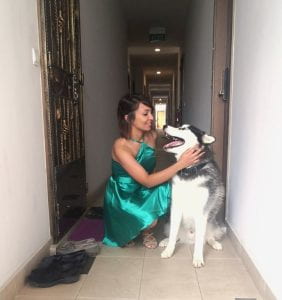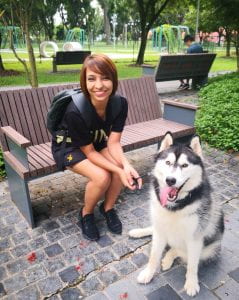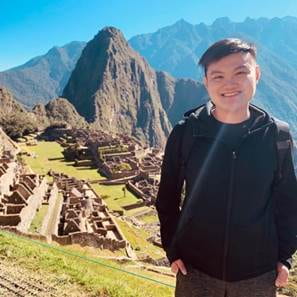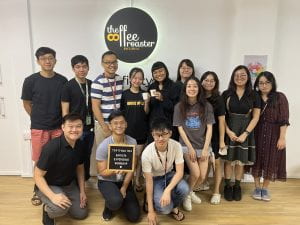Previously, we had introduced the Residential Wellness Managers (RWMs) of UTown Residence (UTR) and Prince George’s Park Residence (PGPR). Guess what, a few more RWMs have come onboard since then! In this article, let us get to know them better as human beings beyond their professional role, and find out about some of their hobbies and quirks. For more information on what exactly an RWM is, read till the end of the article!
Jaya Rajesh (RWM for LightHouse, Pioneer House, Helix House)
Hello, I am Jaya. I am the RWM in charge of LightHouse, Pioneer House, and the future Helix House. Some things about me: I am a social worker by training, and have a strong desire to support the people who need help. In my free time, I like to cook, bake, dance, and listen to music. I also keep and write a gratitude journal daily. And of course, I love to spend time with my family and friends!
With regards to the RWM role, I consider myself as a staff to the students in the hostels. As I am not part of the hostel management team or from the faculty, some students may be more comfortable to share their concerns with me. Moreover, as I’m from India, I can empathise well with international students who may face challenges adjusting to life in Singapore. As of now, I attend events organised by the respective Houses, and interact with students during the sessions. In addition, some students connect with me via Telegram if they need my help!
I was born in India, and received my Masters of Social Work upon graduating from the University of Kerala. I also went on to get a Masters in Narrative Therapy and Community Work from the University of Melbourne, Australia!
I have nearly 18 years of work experience. I first started my career working in an addiction centre, and later, the Ministry of Social and Family Development (MSF). I then went on to undertake the role of a Medical Social Worker (MSW) in a hospital. This was the role that I worked in for 12 years, before finally joining NUS. Throughout my career, I have mainly worked with older people, including adults. Now, I am excited to transition to working with a younger population in NUS.
In NUS, I frequent the PGPR canteen a lot, especially since it is located near to the Houses that I am in charge of. I love to eat mala there! I also enjoy having fish soup from Eureka Taste (Medicine Block 6) and Ayam Penyet from the Science canteen (Frontier).
If I had the freedom to do anything in NUS, I would definitely choose to visit the PitStop at the Science faculty to relax for a day. I would probably lounge in the massage chair, have fun with the Nintendo Switch and enjoy some quiet time by indulging in a comic book.
What does wellness mean to me? Well, I think that it is a positive state of mind. Any activities or places that bring me joy could be a form of wellness. For example, after a long day at work, preparing meals for my family gives me happiness – therefore it is a wellness activity to me.
Jaya preparing food for her family
Here are some fun facts about myself: I currently learn Indian classical dance. I look forward to dance lessons every week, where I not only get to learn Indian classical dance, but also get to interact with my friendly classmates. Furthermore, I catch at least seven hours of sleep a day. To me, the most essential things are getting sufficient sleep, and spending time with like-minded people. I find that pursuing personal hobbies, engaging in social interaction, exploring meditation, getting sufficient sleep, etc., are some things that students can consider adopting, especially to cope with the stresses of life.
Jaya on-stage for her recent Mohiniyattam (Indian classical dance) performance
While I have not experienced any major mental health challenges myself, I have definitely experienced my fair share of stress during my schooling days, especially during exam periods. Fortunately, I think that because I focused on enjoying the learning process rather than the outcome, I did not feel too pressured during my university days. I enjoy learning new things and want to continually improve my knowledge and skills! However, I have had classmates who I had observed struggling with depression; out of a sense of inadequacy, the priority became the outcome (their grades) and aiming for perfect scores. Hence, I would reach out to talk to them, and listen to their struggles and aspirations.
With my current role as an RWM, I look forward most to supporting the students. I think (and hope) that it is a great feeling for them to have a outlet (RWMs) to share their problems freely without the fear of being judged. Building trust and rapport with the students is important for them to feel comfortable with opening up, and thus I try my best to take advantage of every opportunity to interact with students. With my years of experience in healthcare, I believe that preventive work is as important as treating health problems. Therefore, I see myself connecting with the students by organising workshops and events based on their needs (e.g. suicide awareness and prevention, self-care, etc.). When students have issues, they can reach out to me for help. I can be their first line of support during office hours.
To conclude, here is some parting advice from me: Sometimes, we are unable to solve our own problems, and that is okay. It is a chance for someone who cares to connect with us again, and together, we can find better solutions to our challenges.
D’Cruz Joan Lavina (RWM for Temasek Hall, Eusoff Hall, Raffles Hall)
Hey! I’m Lavina, the RWM serving Temasek Hall, Eusoff Hall, and Raffles Hall. In my free time, I play a bit of Sudoku and take walks with my (very opinionated) pet husky, Isaac!
Lavina with her pet husky, Isaac
So far, interacting with the students at the respective halls has been eye-opening, and they have made me feel…young (haha)! But in all seriousness, I truly feel like I am part of something larger. With my team of students, I think that we can help bring mental health awareness to the forefront of important discussions and initiatives. Students not staying in these halls can feel free to approach me to talk as well!
Before coming to NUS, I was actually a trained psychiatric nurse with 13 years of clinical nursing experience. Moving forward from my previous career, I sought out more challenging opportunities in my field. I also hoped to provide life-changing support to others. I soon realised that a role as an RWM allowed me to achieve both of these aspirations.
As an RWM, I am usually based at S6 (Science) or UTown. But given my role, I am usually fortunate to be able to do my work wherever I need to. I recently visited the Yale NUS library with my colleague and fell in love with the place, so it might be my new haunt!
To me, wellness means incorporating healthy habits into one’s daily life. I take care of my own physical and mental wellbeing by taking evening walks around the park with my parents. I have also picked up pilates, and am trying to convince my colleagues to join me 😉.
There is a lot of research on the benefits of exercise and its impact on mental wellbeing. So, my advice is that a good walk around the neighbourhood will be a good start! Previously, there was a time when I was working overseas as a mental health nurse. I made a conscious effort to join a gym, learn how to box, and make friends with the trainers there; I even roped in my fellow colleagues to join me. Those activities kept me occupied, tired me out in a positive way, and allowed me to have a better sleep at the end of the day. I would also plan hikes with my new friends! Hence, I suggest engaging in some form of physical activity for students to work on their mental wellbeing – it is a constant process.
Lavina and Isaac out for a walk at the park
Here is some parting advice from me: Be yourself; everyone else is already taken (Oscar Wilde).
To me, an RWM is one who is committed, open-minded and passionate. I look forward greatly to engaging with the students and hall staff, and overall being a friend to them!
Pragati Pritmani (RWM for Kent Ridge Hall, Sheares Hall, King Edward VII Hall)
Hi, I’m Pragati and I’m an RWM supporting three halls on campus – Kent Ridge Hall, Sheares Hall and King Edward VII (KE7) Hall. I love film photography, and exploring new places; I also have a soft spot for any kind of dumplings and noodles!
Last year, I was fortunate enough to be able to do the Everest Base Camp Trek in Nepal with my father and sister. It’s been one of the best experiences I’ve had to date. I find that trekking can be very much likened to life, where the final destination doesn’t matter quite as much as the journey there.
Pragati (left) and her family at the Everest Base Camp!
My career journey has meandered quite a bit after my graduation. I initially started off teaching English and Science to primary school students. I then went on to teach smaller groups at a neuro-educational start-up. While I loved the creative aspect of teaching using clay and process drama, I found myself taking a break from that, and eventually becoming a counsellor. As part of my training to become a counsellor, I interned at the Yale-NUS Counselling Centre, and loved the experience. I then explored working within a university after graduating, and chanced upon the RWM role here at NUS, which leads me to where I am now!
I was not a previous student of NUS, but I spent some time on campus when interning at the Yale-NUS Counselling Centre. I enjoy being on campus and am still exploring the different parts of it. So far, the coffee at Coffee Roasters has lived up to its name, and I love the Ma La Xiang Guo at PGPR. An ideal day here would be the balance of exploring the food options throughout campus while also being able to appreciate the lovely green spaces. During my university days, I loved grabbing food or coffee and sitting at any of the green spaces as a way to disengage from busy life and relax.
Wellness to me is balance – it’s figuring out what it is that you’re prioritising on a particular day by listening to what your body or mind needs at the moment and focusing on it. For example, if I find myself constantly thinking about an upcoming deadline, I would explore what emotion is driving the thought; for me, that emotion is usually anxiety. I would then decide on what things I could do to cope with the identified anxious feelings. These things could be activities more external to the mind, such as speaking to family or a close friend about it, or something more internal, such as engaging with deep breathing for a few minutes throughout the day.
One of the things I do to improve my physical wellbeing is to reframe exercise as movement, including practices such as walking a longer route home or going for a fitness class. Both these things help keep me physically active. Over the past year or so, I’ve tried different classes ranging from boxing to spin. I also regularly play tennis. As for mental wellbeing, I practise mindfulness daily and incorporate time where I get to decompress and relax for the day. This could entail spending time with my family, friends or even by myself.
Pragati on a nature hike Pragati with elephants in Krabi
I look forward to engaging with the students on campus. I am keen to see exactly how mental health is perceived by them, and what can be done to support students within this area. I’m interested in co-creation, such as where students and myself work together to develop programmes and initiatives to support the overall student body’s mental wellbeing.
If you see me around campus, please say hi, and if you’re ever struggling with something, do reach out!
Si Wei (RWM for Tembusu College, RC4)
Hello! I am Si Wei, the RWM for Tembusu College and Residential College 4. I am also a Registered Social Worker by training. I love to travel around the world to explore new places and experience different cultures. However, during the Covid-19 pandemic when international travel ceased, I cultivated a new interest in home gardening at my balcony, which I take pride of, and started to practise mindfulness on a daily basis.
So far, I have been providing supportive and coaching sessions to students who require a listening ear, and trying to provide clarity when they share the challenges they face with me. I have also been training and supporting the Peer Student Helpers, such as Residential Assistants and Peer Student Supporters, to build their capacity in delivering the duties of care for the hostels’ residents. I get to outreach and interact with other hostel’s residents through events, such as WellNUS Festival in 2022. As RWMs, we are supporters, educators, advocates and partners for students’ personal wellbeing and growth. I feel that I am in a privileged position to be able to work directly with students and to advocate on the importance of mental wellness and self-care.
Si Wei (front, left) at a Wellness Workshop (Barista Experience Workshop) with RC4 students at The Coffee Roaster Infinity Coffee Studio
For non-residential students, NUS has an extension network of supportive resources like University Counselling Services, OSA Student Wellness and Faculty Student Support Managers. There is always help and support available as long as the students are willing to reach out when they are in need.
I first started my career as a teacher in a public school. I had the opportunities to work with many students from underprivileged backgrounds and it spurred my interest to find out more about social issues, such as poverty and mental health. Hence, I took a Master in Social Work and made a career switch to become a community social worker. This experience was a humbling one – while supporting families and individuals facing challenging issues, I also learnt a lot from their resilience and grit in overcoming multiple difficulties in life. Nonetheless, I found that I am still an educator at heart, and nurturing students was still my ultimate calling. Hence, I ended up with my current RWM role, which is a perfect combination of both education and social work!
I did not previously study in NUS, but I totally appreciate the diversity of the student’s population and the vibrant student life. There are always many activities and events happening on campus. At the same time, I am impressed with the extensive supportive network with NUS, and the addition of the RWM role would certainly value-add and compliment what is in place to reach out to the hostels’ residents.
I spend most of my working hours in UTown due to its proximity to the hostels I am working with. I like the greenery and the resort vibe in UTown. I personally love the Korean Food at Hwang’s as it sells good Korean food at an affordable price! An ideal day would be for me to explore different parts of NUS and do my work at different places. The campus is just so huge that I still have not visited many places.
I think that wellness is multidimensional in nature. Your physical wellness (physical health), mental wellness (self-awareness of your mental state and ability to cope with stressors), social wellness (adequate social support and network) and spiritual wellness (purpose and meaning in life) are all important in enabling you to lead a fruitful life. I believe that setting clear boundaries between work/studies and personal life is essential in maintaining good wellbeing. Being an advocate of mental wellness, it is of paramount importance for me to be a role model and practise what I preach. It is helpful to have a ritual in transiting out of work, such as listening to my favourite music while commuting home after work.
Here’s an extra tip: The NUS 7 PitStop Principles (Personal Skills, Interaction, Time-out, Sleep, Thoughtful Eating, On the move and Purpose) is an effective framework for guiding students to achieve mental wellness. Do find out more about it!
When I was a University student, I struggled with the overwhelming stressors from my academic work, CCA and other commitments as well. What worked for me was to know that I was not alone – that my friends and classmates were experiencing the same stress as well. Hence it was helpful to have a positive group of friends and comrades to journey through challenging times. I found it helpful to have a schedule to plan each timing and task to be completed until the end of semester, allowing me to see clearly when the difficult time would end. I would also intentionally plan time away from work regularly to do something I like, to ensure that I have the space to recharge and improve my capacity to cope with the challenges ahead. Having experienced university life already, I am now excited to be able to engage with current students directly, and journey with them through their time in NUS, as it will be the best time of their life.
Since young, we are all taught to be kind to others, but we are rarely being told to be kind to ourselves. Hence, many of us start looking into our personal wellbeing only when we have reached the tipping point. We are only human and we all have our good and bad times. During bad times, it is totally okay to be not okay, and it is not selfish to engage with self-care. Rest assured that there is always help available and it is okay to seek help. The day we can all comfortably acknowledge our vulnerabilities is the day where we will be able to remove the stigma surrounding mental health.
We hope that this article has demystified the warm and unique personalities of these new RWMs. Students – go forth and talk to an RWM if you ever need a listening ear! In the meantime, we have compiled a short FAQ section that details more on the role of RWMs and other questions that you might have after reading this article, so read on!
What exactly is the role of an RWM?
An RWM’s main role is to provide emotional support to the residents with personal or mental health issues. They do check-ins and follow up with residents who are feeling overwhelmed or suffering from mental health challenges. They also meet with any students who need a listening ear. RWMs can also refer you to the University Counselling Services or University Health Centre if required. They can also accompany residents to see the counsellors especially when students are feeling uncomfortable or anxious about it.
What about the SSM?
An SSM also plays a supportive role similar to the RWM. In addition, if your concerns relate to academic issues, it would be ideal to make an appointment to see them first. SSMs can advise on matters regarding modules, Leave of Absence and candidature.
Who should I approach? The Residential Wellness Manager (RWM) or Student Support Manager (SSM) of my faculty?
The short answer is: It does not matter – both are good options! NUS is committed to your mental health and wellness. Both the RWM and SSM can provide support to the residents with personal or mental health issues. It is really up to you who you want to talk to. Both RWM and SSM are trained to refer you should you need other help and resources. You can discuss topics like academic concerns, relationships, personal goals and mental health challenges etc.
Will other people know about what I share with the staff?
The matters that you discuss are private. However, in order to render help, there are times that other parties need to be informed. Talk to your RWM or SSM about this.
I still think it is embarrassing to approach someone for help when I have some stress.
All of us go through some form of challenges and struggles from time to time. Asking for help is not a sign of weakness but it is a sign of strength that you want things to get better! Seeking help from an RWM or SSM can provide you with other perspectives and options to your challenges and help you better cope with your concerns.












